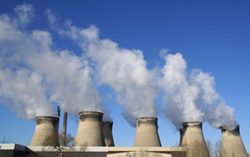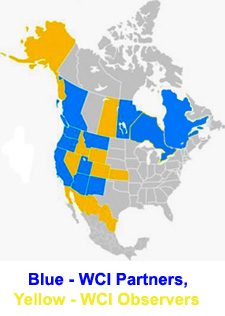 The Western Climate Initiative mandates that owners or operators of general stationary combustion units using mixed fuels and waste-derived fuels use ASTM D6866 to determine the biomass fraction of their carbon dioxide emissions. Mixed fuels are mixtures of biomass/biomass fuel and fossil fuel. Waste-derived fuels are those derived from wastes, excluding materials that are pure biomass. Examples of waste-derived fuels are waste oil, plastics, solvents, municipal solid waste, tires, dried sewage or impregnated saw dust (saw dust containing resins, preservatives, or other substances derived from fossil fuels).
The Western Climate Initiative mandates that owners or operators of general stationary combustion units using mixed fuels and waste-derived fuels use ASTM D6866 to determine the biomass fraction of their carbon dioxide emissions. Mixed fuels are mixtures of biomass/biomass fuel and fossil fuel. Waste-derived fuels are those derived from wastes, excluding materials that are pure biomass. Examples of waste-derived fuels are waste oil, plastics, solvents, municipal solid waste, tires, dried sewage or impregnated saw dust (saw dust containing resins, preservatives, or other substances derived from fossil fuels).
According to WCI’s final version of the first group of Essential Requirements for Mandatory Reporting, ASTM D6866 testing is “not required for fuels that contain less than 5 percent biomass by weight or for waste-derived fuels that are less than 30 percent by weight of total fuels combusted in the year for which emissions are being reported, except where the operator wishes to report a biomass fuel fraction of CO2 emissions.”
Other pertinent excerpts from the WCI document relating to ASTM D6866:
The operator shall conduct ASTM D6866-06a analysis on a representative fuel or exhaust gas sample at least every three months, and shall collect exhaust gas samples over at least 24 consecutive hours following the standard practice specified by ASTM D7459-08.
If there is a common fuel source to multiple units at the facility, the operator may elect to conduct ASTM D6866-06a testing for one of the units.
An operator who uses CEMS data to report CO2 emissions from a facility that co-fires fossil fuels with biomass fuels or waste-derived fuels that are partly biomass shall determine the portion of total CO2 emissions separately assigned to the fossil fuel and the biomass using the method provided in WCI.23(f) (ASTM D6866), if applicable.
For more details, see pages 51 and 52 of the regulation found here.
The WCI document published on July 15, 2009, contains general provisions for all reporters; requirements for third-party verification; and greenhouse gas monitoring, reporting, and record-keeping methodologies for these source categories only:
* Adipic Acid Manufacturing
* Cement Manufacturing
* Coal Storage
* Electricity Generation
* Electricity Imports
* General Stationary Combustion
* Hydrogen Production
* Iron and Steel Manufacturing
* Lime Manufacturing
* Petrochemical Production
* Petroleum Refining
* Primary Aluminum Manufacturing
* Pulp and Paper Manufacturing
* Refinery Fuel Gas Combustion
* Soda Ash Production

WCI jurisdictions are expected to implement these essential requirements in time for the 2010 reporting year. The WCI continues to develop methodologies for other emission source categories not mentioned above and plans to release drafts of these methodologies for stakeholder review later this summer.
The Western Climate Initiative is a collaboration of seven U.S. governors and four Canadian Premiers. WCI Partners are Arizona, British Columbia, California, Manitoba, Montana, New Mexico, Ontario, Oregon, Quebec, Utah, and Washington.
Blue – WCI Partners, Yellow – WCI Observers
This entry was posted on Friday, July 17th, 2009 and is filed under Biobased Regulations, Renewable Carbon .